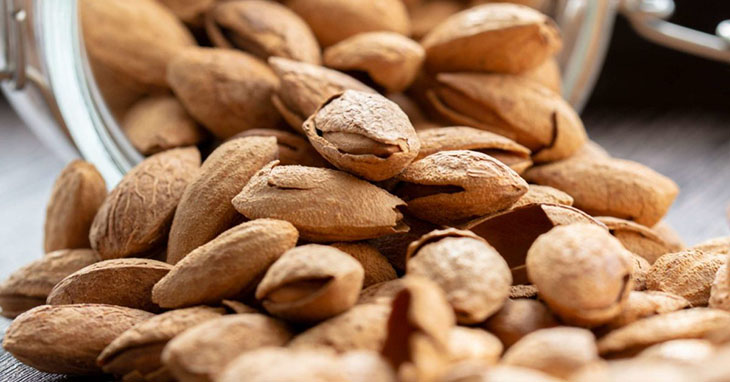3. Almonds

Plant seeds like almonds contain phytic acid, also known as phytate. It is the primary form of phosphorus storage in seeds. Phytate is then broken down and phosphorus is released when seeds sprout. The young plant will use the phosphorus. Inositol hexaphosphate, or IP6, is another name for phytic acid. Because of its antioxidant properties, it is frequently used commercially as a preservative. Phytic acid is found in varying amounts in all edible seeds, grains, legumes, and nuts. Roots and tubers also contain trace amounts. Almonds have the highest concentration of phytic acid. Phytic acid inhibits or prevents your body’s absorption of zinc, iron, calcium, and other minerals. This only applies to a single meal, not nutrient absorption throughout the day. In other words, phytic acid reduces mineral absorption during the meal but may not have a significant impact on subsequent meals. Snacking on nuts between meals, for example, may reduce the amount of iron, zinc, and calcium you absorb from the nuts but not from the meal you eat later. However, if you consume phytate-rich foods with the majority of your meals, mineral deficiencies may develop over time. This may be a significant issue during times of malnutrition, in developing countries where grains or legumes are the primary food source, and in those who have kidneys sensitive to oxalates or other compounds that prevent or impair nutrient absorption.
Almonds have been consumed by people all over the world for thousands of years. Today, California produces approximately 80% of all almonds, but almonds can be found in foods and even as flavors in beverages all over the world. If you’re looking for a healthy addition to your diet, a small serving of almonds here and there can make a big difference – but they’re high in oxalates. When oxalate is consumed, it can bind to minerals to form compounds such as calcium oxalate and iron oxalate. This is most common in the colon, but it can also happen in the kidneys and other parts of the urinary tract. Most people eliminate these compounds through their feces or urine. High oxalate diets, on the other hand, have been linked to an increased risk of kidney stones and other health problems in sensitive individuals.
Eating almonds on a regular and large scale can increase your risk of developing kidney stones. This answer, however, may be slightly misleading! Because, while almonds can increase the risk of calcium oxalate stones, they have no effect on the formation of other types of kidney stones. In this case, it is more accurate to say that eating almonds increases the risk of developing the most common type of calcium oxalate stone. This is especially true if you have previously had the same type of stones, as the recurrence rate for calcium oxalate kidney stones is approximately 50% in the following ten years. Almonds are linked to an increased risk of calcium oxalate stones because they are high in oxalate, a naturally occurring compound found in many foods. They claim that in order to help prevent the formation of calcium oxalate stones, an adequate amount of dietary calcium should be consumed each day, and that calcium and oxalate-containing foods should be consumed at the same time if possible.



